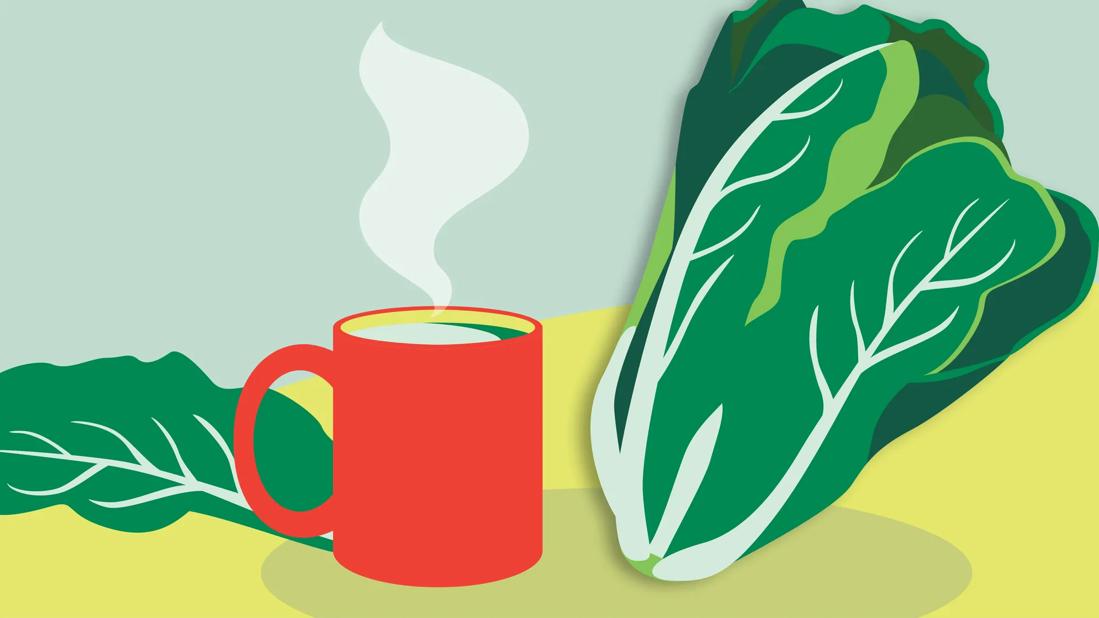While it’s rich in antioxidants, this leafy water trend is likely not much of a sleep inducer

Image content: This image is available to view online.
View image online (https://assets.clevelandclinic.org/transform/efa816fd-79c5-44d2-9046-4f205881ebe8/hot-lettuce-water-825154518)
Hot mug of lettuce water, with lettuce stalks nearby
A bed of lettuce is a mainstay for a variety of salads — but can it also help you nod off at night more easily?
Advertisement
Cleveland Clinic is a non-profit academic medical center. Advertising on our site helps support our mission. We do not endorse non-Cleveland Clinic products or services. Policy
Some users on TikTok seem to think so. Sure, you’ve heard of herbal tea and other natural-based remedies to help you fall asleep. But what about lettuce water? Yes, you read that right. People are dropping lettuce in hot water and sipping it as a bedtime brew to help them fall asleep.
But this bedtime green juice may not be as sleep-inducing as it seems.
Here’s what registered dietitian Julia Zumpano, RD, LD, thinks about this trend that promises better sleep than counting sheep.
The origins of this leafy water trend aren’t exactly known, but there are some facts and research about lettuce that people point to. The basic premise is that you put lettuce — either iceberg or romaine — in hot water as a way to create a sleepy “lettuce tea” to have before bed. Some people even add peppermint for an additional calming effect.
But how does lettuce connect with sleep? Some lettuce has a milky fluid, called lactucarium, in the base of its stems. Lactucarium is thought to have some sedative properties effects, although this hasn’t been proven through scientific study.
Lettuce is also rich in polyphenols, a class of plant-based compounds that have antioxidant properties and various health benefits but are not specifically related to sleep or calming.
Advertisement
First things first: You should know that the main research that has been done on lettuce and sleep has been in labs in nonhuman studies. So, you should take any evidence with a large grain of salt.
But here’s what the studies tell us. A 2020 research study in Turkey tested several different types of lettuce to see their possible sedative effects and found there wasn’t enough evidence to support lettuce as a sleep aid.
Another nonhuman study from 2017 used an extract from different types of lettuce to see how it affected sleep patterns. The study did find an increase in sleep duration from red romaine lettuce extract. But the use of a concentrated extract in a small study in the lab doesn’t mean it will translate to your use of lettuce water at home.
There aren’t any concrete health benefits to lettuce water and no hard evidence that it will help you sleep better — but there’s no harm in trying either. Plus, there’s nothing wrong with working more lettuce into your diet.
But Zumpano points out that you’re more likely to get the most benefits of lettuce by eating it with your meals instead of steeping it in hot water.
“You’re going to get all the nutrients in it that way,” she notes.
Lettuce is:
Chances are, if you’re searching online about lettuce water, you’re probably struggling to catch some quality ZZZs. While this particular trend is fairly harmless, Zumpano says to be wary of any quick-fix strategies that pop up on your social media feeds.
“In this case, it’s completely harmless. But there are clinically proven ways to help you sleep that you can try instead,” she explains. “And you should try those before starting any trends.”
Some things you can try for better sleep include:
Advertisement
If you’re struggling to get to sleep, there are plenty more options you can try, too. “If you do struggle with your sleep, contact your healthcare provider for help,” Zumpano advises. “Your sleep is important. Better rest leads to better health outcomes overall.”
Advertisement

Sign up for our Health Essentials emails for expert guidance on nutrition, fitness, sleep, skin care and more.
Learn more about our editorial process.
Advertisement
Sleep masks can help you create total darkness so you can sleep better
To avoid sleep deprivation and shift work sleep disorder, try adopting habits that minimize light exposure and prioritize daytime sleep
Sleep disorders, mental health conditions and other health concerns can all affect the quality of your sleep
Most people fall asleep within 10 to 20 minutes, but if your experience is different, adjusting your sleep schedule may help
Stick to a consistent schedule, be mindful of screen time and work on reducing your stress levels before bed
Napping can boost focus, memory and mood — if you time it right
These devices can help shed light on what’s happening with your body during rest
Keep a dream journal, set your intentions before bed and make sure you’re getting a full night of high-quality sleep
Prioritize your health by managing stress, strengthening your social connections and getting quality sleep
Bolsters, blankets, pillows and blocks can offer extra support, stability and comfort
Allergies, postnasal drip, asthma or reflux could be to blame for a cough that won’t quit